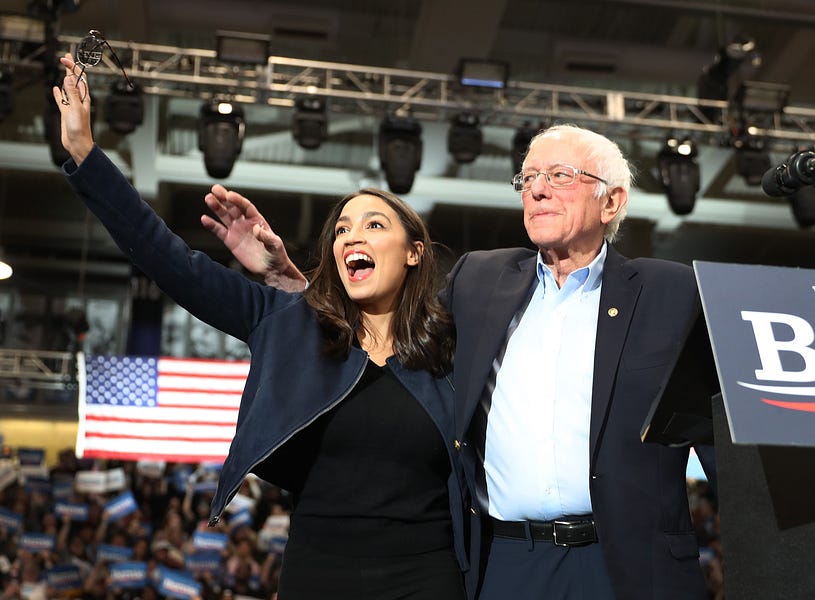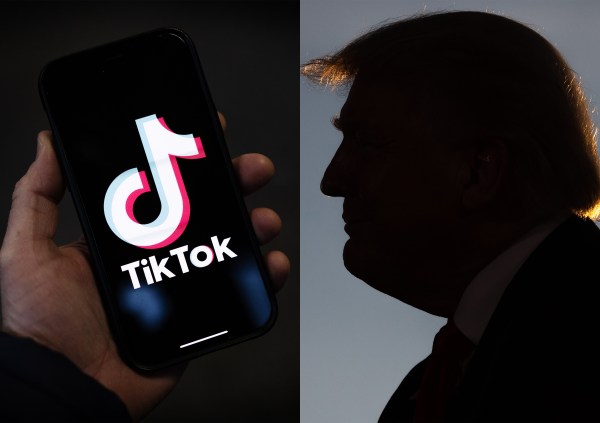By all evidence, we’re nearing the end of the Bernie Sanders experiment in America. Just last night, Joe Biden won primaries in Florida, Illinois, and Arizona and has a near-lock on the Democratic nomination. Where does that leave Sanders’s legacy on American politics and the Democratic Party?
Conventional wisdom since 2016 has held that Sanders pulled the “Overton Window” (which we’ll discuss more below) of the Democratic party toward his brand of democratic socialism. Sanders himself declared as much, saying before the no-audience debate with CNN that his campaign had “won the ideological debate.” This, despite the fact he’s losing in landslide fashion in the vital campaign metrics of votes cast, delegates, and polling.
At the height of the Sanders boomlet in the 2020 race, mainstream writers and journalists were freaking out. David Brooks said, “I’ve just watched populism destroy traditional conservatism in the GOP. I’m here to tell you that Bernie Sanders is not a liberal Democrat. He’s what replaces liberal Democrats.” But if you can’t win a nomination, how far is your capacity to change a party? Is Sanders’s power under- or overstated?
The Overton Window.
It’s popular in current political parlance to talk about the Overton Window and how shifting it can affect a political party. I’ve written as much myself in the past. But so much of the Overton Window discourse is overblown, suggesting that the window is some one-directional shift for either party.
As a quick primer, the Overton Window references Joseph Overton’s theory that policies embraced by parties alter and shift over time through a dynamic and complex series of factors. Most pundits use it to describe political candidates who purposely take extreme stances on issues to change the party toward their desires, rather than win the election. It’s worth noting that even Overton referred to this as a rare event—and politicians themselves moving the Overton Window is rarer than its given credit—see all the single-issue candidates who have made zero impact over the years.
All of this suggests that politicians are more followers than they are leaders — it’s the rest of us who ultimately determine the types of policies they’ll get behind. It also implies that our social institutions — families, workplaces, friends, media, churches, voluntary associations, think tanks, schools, charities, and many other phenomena that establish and reinforce societal norms — are more important to shaping our politics than we typically credit them for.
Claiming to have shifted the Overton Window is often a losing candidate’s way of claiming a moral victory. It’s possible public attitudes can change toward an electoral loser, but the opposite can also occur. If people come to believe that your extreme views are electoral suicide, they can turn away from those ideas.
Let’s take conservatism and the Republican Party as an example. George H. Nash’s masterful history of the conservative movement, first published in 1976, is a story of continual ascendance. The abbreviated version says that fusionist conservatism became ascendant by using Barry Goldwater’s nomination as a launching point that changed the direction of the GOP. That change of direction paved the way for Reagan.
There’s much truth there, and I mostly subscribe to Nash’s history. But it’s also equally valid that Goldwater’s landslide loss paled in comparison to the impact of Richard Nixon’s resignation after sweeping landslide victories. If Watergate never happens, Nixon never resigns, and the country peacefully moves on to Gerald Ford after Nixon, does the Reaganite/fusionist moment ever arrive? It’s considerably easier to take the party in a new direction when the entire old order is getting wiped out in elections and leaving in disgrace.
Put another way—we only get Reaganism because Nixon’s resignation sunk the party. The key was not an Overton Window shift by Goldwater—it was the downfall of Nixon. In an alternate timeline, if the choice is the unknown Reagan vs the vice president of a previous electoral landslide winner, the option is much harder, even with Reagan’s incredible charisma.
I bring all that up because when you look at Bernie Sanders, the only reason he’s even a household name is because of the singular unpopularity of Hilary Clinton. Bernie got to run against his own version of Nixon, blasting all the same vices, though he never landed a knockout blow. Clinton was so unelectable that the country chose a reality TV show host with no governing experience.
That’s part of the reason I don’t see Sanders’s legacy as an Overton Window moment. Bernie began as a protest vote and is trying to become something more. It’s not clear he’s succeeding. Biden has paid homage to some of Sanders’s policies—most recently a form of free college tuition—but he’s not yet seriously adopting them or a democratic socialist worldview.
By contrast, Donald Trump could seriously alter the course of the Republican party with a second win—mainly if someone like Mike Pence follows him up. His impact would rival that of Reagan or Nixon in that regard. Put another way, the Overton Window only matters in a loss if another more successful candidate comes behind the loser and brings it to fruition. And those shifts remain the standard until someone else comes along with their own changes and wins.
Sanders and the future of socialism.
That brings me to the next, more controversial view of Sanders, which is that he is not the representative of modern socialism. There has indeed been a resurgence of socialism, but Sanders represents the old guard; he doesn’t speak the language of modern socialism represented by people like Alexandria Ocasio-Cortez or Stacey Abrams. To explain that, we need to step back and look at standard-issue Marxism.
One of the foundational precepts of Marxism is class consciousness. When classic Marxists talk about the workers of the world uniting, they’re referring to the working class awakening to the idea that they all hold the same class position in life: subjugation to those who own capital. The standard treatment on this comes from George Lukcas, who wrote in 1920:
It must not be thought, however, that all classes ripe for hegemony have a class consciousness with the same inner structure. Everything hinges on the extent to which they can become conscious of the actions they need to perform in order to obtain and organise power. The question then becomes: how far does the class concerned perform the actions history has imposed on it ‘consciously’ or ‘unconsciously’? And is that consciousness ‘true’ or ‘false’. These distinctions are by no means academic.
Bernie Sanders attacks this form of class consciousness with wild abandon in nearly every speech. His point is to raise resentment among those who don’t make millions and billions, and cause a socialist, populist uprising against the capitalist order. It’s the stated goal of Marx and Engels, “The immediate aim of the Communists is the same as that of all other proletarian parties: formation of the proletariat into a class, overthrow of the bourgeois supremacy, conquest of political power by the proletariat.”
As Sanders said himself in a column in the Des Moines Register in 2016, “our campaign is focused on making sure the government stops representing billionaires and start representing us — the working class of this country.” It’s the fight of the working class against the capitalists.
While classic Marxism is aware of racism, race is not an animating factor of Marx or socialism. Even among those defending Marxism as anti-racism, they say: “despite all the evidence of this commitment to fighting racism over many decades, Marxism has been maligned as, at best, “blind” to combating racism and, at worst, “incapable” of it.”
And so, while Sanders can talk about issues of race, everything is still filtered through concepts of class rather than race.Sanders represents the old guard, trying to awaken everyone across all races to a higher unifier: that of their shared class and need to disdain millionaires and billionaires.
Woke Marxist fusionism.
For the new left, however, race is not secondary to class. Race informs class. “Woke Marxism” uses race to define class—if you’re part of a marginalized demographic, you’re automatically placed within a class, regardless of economic standing. It can become more precise too; you’re not just black or brown, but broken down further with sex, and sexual identity. The more specified, the more acute your marginalization.
Identity politics is the animating feature of the new Marxist consciousness. Instead of relying solely on class for a Marxist awakening, it’s identity or race. Instead of this being a dividing point, like you may think, it’s pushed as a unifier. Everyone seeks the same goals against the capitalist system.
Speaking to a reporter with The Intercept at SXSW in 2019, then newly elected Rep. Alexandria Ocasio-Cortez said that, “the effort to divide race and class has always been the tool of the powerful to prevent everyday working people from taking control of the government.” She went on to describe why that shouldn’t be the case.
In a more forceful case, Stacey Abrams in the March/April 2019 issue of Foreign Affairs wrote about how shifts in culture demanded a different approach. Abrams writes:
These changes have encouraged activists and political challengers to make demands with a high level of specificity—to take the identities that dominant groups have used to oppress them and convert them into tools of democratic justice. Critics of this phenomenon, including Francis Fukuyama … condemn it as the practice of “identity politics.” … But what Fukuyama laments as “fracturing” is in reality the result of marginalized groups finally overcoming centuries-long efforts to erase them from the American polity—activism that will strengthen democratic rule, not threaten it.
Abrams continued, leaning into a hard critique not just of the current system, but past movements saying, “Racism and sexism have long tarnished the heroic story of the U.S. labor movement—defects that contributed to the rise of a segregated middle class and to persistent pay disparities between men and women, disparities exacerbated by racial differences.”
This is, in effect, a shift from class-consciousness to race and identity consciousness. Instead of one overarching working-class identity, everyone carries with them the marginalized status of their race. It’s not “workers of the world unite.” It’s marginalized peoples of the world unite—and claim your identity to redress grievances you have against those above you. Abrams ends this piece by pointing away from class consciousness, and towards the new way:
The natural antidote to this condition is not a retrenchment to amorphous, universal descriptors devoid of context or nuance. Instead, Americans must thoughtfully pursue an expanded, identity-conscious politics. New, vibrant, noisy voices represent the strongest tool to manage the growing pains of multicultural coexistence.
Bernie Sanders does not speak this language. His proteges and successors in the far-left, however, do. Bernie’s ideology is pure class-based. His successors are replacing that framework with an identity-politics alternative.
Why is this race/class distinction important, you may ask? When Alexis de Tocqueville visited America, he said later on that in the United States, “you will search in vain for socialism.” He pointed to democracy and the equality offered to all citizens economically. America’s lack of a class served, in a way, as an inoculation against socialism getting a strong foothold.
While America may not have discreet classes or an aristocracy to fight against, it does have a history with racism. The new socialists, having learned the lessons of the old, are strapping the two concepts together in a bid to give socialism the intellectual foothold in America that it never had in Sanders’s heyday.
But this shift isn’t happening over the entire Democratic party; it’s mainly the socialist wing of the party. It’s the old guard vs. the new.
It should also explain some of the anti-Semitism in woke Marxism. New socialists view Jews as oppressive whites. Bernie Sanders is good with them because of his embrace of socialism, even if he’s not perfect. These woke Marxists naturally side with the “oppressed” Palestinians, who are like other oppressed global minority groups that need race consciousness to overthrow those above them. The pinnacle of this is Linda Sarsour, who said, among other things:
How can you be against white supremacy in the United States of America and the idea of living in a supremacist state based on race and class, but then you support a state like Israel that is built on supremacy?
They’ve made Jewishness a form of whiteness, which means attacks on Jewish identity aren’t anti-Semitic to them. It’s no different than attacking any other racial majority to raise resentment and race/class consciousness. White, Jewish, or capitalist all have the same connotations; it’s the group owning all capital, which means raising racial class resentment is fine.
Woke socialism retains the same weaknesses.
If you take this view of socialism, then it’s not Bernie Sanders moving the Overton Window in the Democratic Party. Ironically, the Overton Window for socialism is moving away from him. Sanders has served as a conduit to bring socialism back to the forefront, and as a springboard for politicians who do speak the new consciousness.
The new left has the same problems as the old—its adherents struggle with coalitions and elections. Ocasio-Cortez won a general election race that a “glass of water” could win, according to Nancy Pelosi. Abrams lost her 2018 gubernatorial race—though she’s never conceded and has 2020 vice presidential prospects. National Journal‘s Josh Kraushaar noted in 2018 that leftists like Abrams lost all nine key races he and other progressives identified as important markers.
But these electoral problems are more of a timing problem than anything else. The Democratic party is old, and over the next decade, it is guaranteed an overhaul in leadership. These new woke Marxists are younger and will try to shift the direction of the Democratic Party. They’re already taking over for the old socialist guard.
The main obstacle to these woke Marxists? Minorities—the people they claim to represent.
Bernie Sanders got wiped out by black voters in 2016, and it appears to be happening again in 2020. Black voters, in particular, are rejecting Bernie Sanders-style socialism for more traditionally liberal candidates like Hilary Clinton and Joe Biden.
The woke Marxist revolution is largely white, at least in terms of voters. While AOC, the chief champion of the group, is herself Hispanic, she won her district by relying on gentrifying neighborhoods. Her Democratic primary opponent, a more traditional Democrat, maintained strength in older communities of black and Latino voters. This election and other events caused the New Republic to ask, just weeks after the 2018 midterms, “Do America’s Socialists Have a Race Problem?” The answer is, of course, “it’s complicated.”
Tellingly, the legal world has found that these gentrified neighborhoods, full of AOC supporters, are far more likely to convict black and brown people of crimes when sitting on juries. According to one expert, “The gentrifiers are not wanting to share—they’re wanting to take over.” These whites are doing the slickest form of cultural appropriation ever; they’re appropriating the legitimate struggle of various minority groups to claim power for themselves.
A similar phenomenon happened in Communist states. It didn’t matter who led the revolution. The working class always got the short end of the stick. The revolution always seemed to benefit certain people more than others. It’s reminiscent of a scene in George Orwell’s Animal Farm:
“I trust that every animal here appreciates the sacrifice that Comrade Napoleon has made in taking this extra labour upon himself. Do not imagine, comrades, that leadership is a pleasure! On the contrary, it is a deep and heavy responsibility. No one believes more firmly than Comrade Napoleon that all animals are equal. He would be only too happy to let you make your decisions for yourselves. But sometimes you might make the wrong decisions, comrades, and then where should we be?”
According to these largely white socialists, black voters sometimes make the wrong decision. This isn’t some hypothetical: Bernie Sanders supporters were calling black South Carolina primary voters “low information” voters.
The inherent faults of old and new Marxism.
Marxism always seems to carry an intrinsic characteristic of one group claiming other people are getting oppressed, and the only way to fix the oppression is to give power to those noticing the abuse, not those impacted. It doesn’t matter if the socialist in charge is part of the community being oppressed or not, they’re only there to validate the argument and elevate themselves.
Bernie Sanders isn’t replacing liberal Democrats. He is being replaced by woke Marxism, though I doubt he sees it. Because he’s the beloved grandfather of this newly constituted left, he gets a pass, even if he struggles with voters. But the new Marxism, fused with race and identity-based politics, has retained all the old problems for itself.
Race and class seem an incompatible fusion in the long run. Not everyone in a race is of the same class, and people in a class do not always agree with those of a different race; racism is still a problem. Woke Marxists demand something that has never existed: people to view themselves as both racial identity and then as a class of people in the same boat. But they do seem determined to take identity politics and use it as the animating factor of Marxist consciousness and keep all the old trappings of Marx. No matter how you build this car, it always ends up in the same place.
This could actually work with black Americans because they have a unique position in America’s history. They’re the only minority group that got forced to create a separate identity from the rest of the country on account of hundreds of years of slavery, the Jim Crow South, and ugly racism—from both government mandate and private society. Assimilation wasn’t an option for them for most of our history. They have a unique identity in the country that no other group can claim. And yet, they are voting against all forms of this new Marxism and socialism; that should send up a red flag to these white woke Marxist supporters, but they seem unfazed.
It could work, but it hasn’t The Democratic primaries have shown that minority voters prefer a more moderate candidate. In South Carolina, Joe Biden won nearly two-thirds of all black voters across the state. In Mississippi, that support shot up to 84 percent. Across all Super Tuesday states in the south, Biden held on to around 60% support with black voters.
Whether or not this new Marxism can take hold depends, I think, on its electoral prospects. If it can’t break through, then it too remains perpetually stuck in the fringe corners of the Democratic Party. And if Bernie Sanders is any indication, the electoral lane for that is narrow and discrete—at least for now. That keeps the threat away from replacing Democrats, and more towards more infighting on the far-left.
Bernie Sanders’s legacy is less in reshaping the Democratic Party than opening the door and giving a platform for these new woke Marxists. How far that legacy runs is up in the air. They have to overcome the same obstacles that sunk Bernie Sanders.
Photograph by Joe Raedle/Getty Images.






Please note that we at The Dispatch hold ourselves, our work, and our commenters to a higher standard than other places on the internet. We welcome comments that foster genuine debate or discussion—including comments critical of us or our work—but responses that include ad hominem attacks on fellow Dispatch members or are intended to stoke fear and anger may be moderated.
With your membership, you only have the ability to comment on The Morning Dispatch articles. Consider upgrading to join the conversation everywhere.